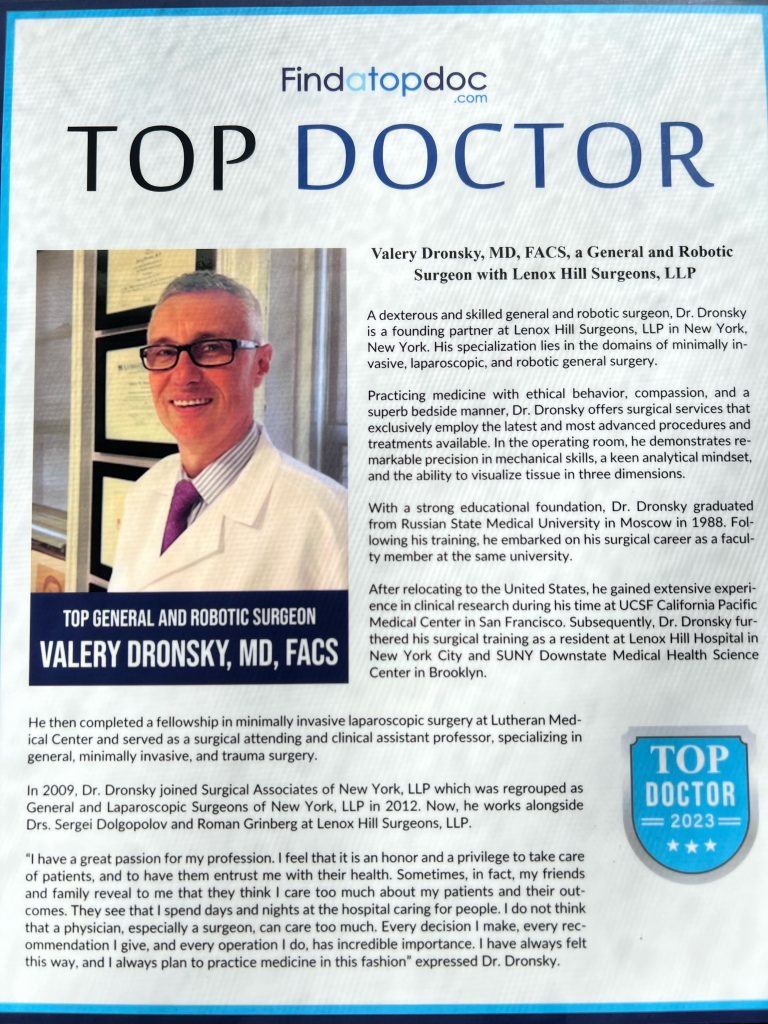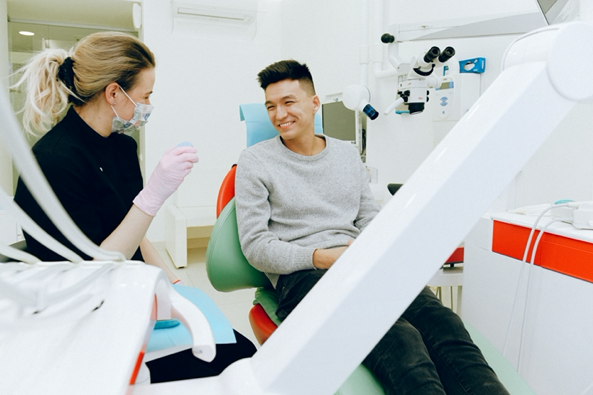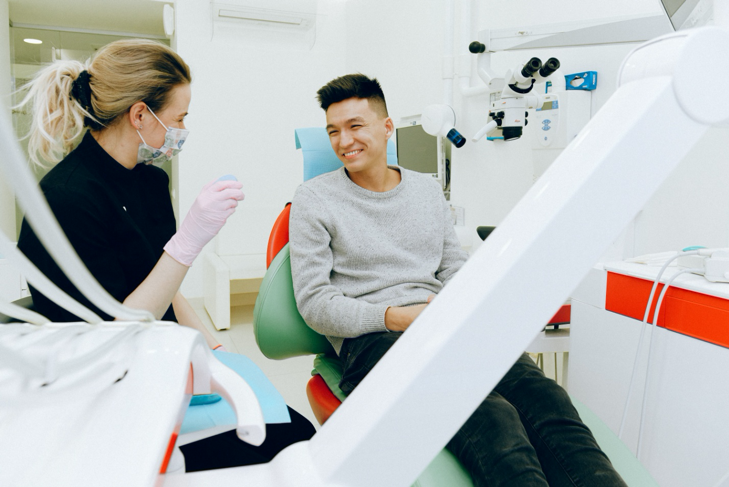CALL TODAY 646-846-1136 | EMAIL
Surgical Experts Dedicated to Improving Lives
At Lenox Hill Minimally Invasive Surgery PLLC, Dr. Valery Dronsky and his staff of medical professionals provide compassionate care with the highest ethical & professional standards. In our state of the art facility, we offer surgical services using only the most cutting edge and current procedures and treatments. We specialize in general surgery, including extensive experience in performing hernia repair surgery. Our expertise is in minimally invasive surgery and robotic surgery. Minimally invasive and robotic surgery often allow patients to experience easier recovery than traditional open surgery. They also allow for more precise and less traumatic surgery. When robotic and minimally invasive surgery is not an option, we are also skilled and experienced in traditional open surgical procedures.
Dr. Dronsky is an experienced and highly skilled surgeon having undergone extensive training in school, residency and fellowships. He practices medicine with ethical behavior, compassion and superb bedside manner. In the operating room he exhibits precision mechanical abilities, analytical thinking and the ability to visualize tissue in three dimensions. These innate and learned skills allow Dr. Dronsky to be one of the most dexterous and skilled professionals in New York City and the Country.
Call us: 646-846-1136
PATIENT TESTIMONIALS
Recent Awards
We are honored and deeply appreciative to have consistently received prestigious awards and recognition year after year, establishing us as one of New York’s foremost hospitals for a wide range of general surgeries, safety measures, specialized procedures, and overall excellence in healthcare. At Lenox Hill Minimally Invasive Surgery, our unwavering commitment lies in delivering exceptional care and unwavering support to our patients, guaranteeing their safety and successful recovery throughout their entire surgical experience.
Hospital Quality Awards
 America’s 50 Best Hospitals Award™ (2023, 2022)
America’s 50 Best Hospitals Award™ (2023, 2022)
Top 1% in the nation for providing the highest clinical quality year over year.

America’s 100 Best Hospitals Award™ (2021)
Top 2% in the nation for consistently delivering clinical quality year over year.

America’s 250 Best Hospitals Award™ (2023, 2022, 2021)
Top 5% in the nation for consistently delivering clinical quality.

Patient Safety Excellence Award™ (2023, 2022)
Top in the nation for providing excellence in patient safety by preventing infections, medical errors, and other preventable complications.
Specialty Clinical Quality Awards

America’s 100 Best Hospitals for Cardiac Care Award™ (2023, 2022, 2021, 2020, 2019)
Superior clinical outcomes in heart bypass surgery, coronary interventional procedures, heart attack treatment, heart failure treatment, and heart valve surgery.

America’s 100 Best Hospitals for Coronary Intervention Award™ (2023, 2022, 2021, 2020, 2019)
Superior clinical outcomes in coronary intervention procedures (angioplasty with stent).

America’s 100 Best Hospitals for Prostate Surgery Award™ (2023, 2022, 2021)
Superior clinical outcomes in prostate removal surgery and transurethral resection of the prostate.
Click to see all of our Healthgrades best doctors awards





Visit our main website at www.LenoxHillMinimallyInvasiveSurgery.com
Blog Posts are Below:
Tag Archives: Inguinal Hernia
Types of Hernias: Inguinal Hernia
An Inguinal Hernia is a condition in which one spot of the abdominal muscle weakens, and this causes muscle tissue to protrude outwards, causing a bulge. Therefore, you can call this hernia a protrusion bulge as well. It is the projection of an organ through the muscle tissues that make up the body wall. Mostly, an Inguinal Hernia encompasses the projection of a particular part of an organ instead. Hernias can be either external or internal in classification.
What is Inguinal Hernia?
An Inguinal Hernia is a type of external hernia that occurs around the intestine and bladder region. Other people refer to this region as the groin area in the body. This type of hernia is the most common amongst other hernias. About 96 percent of hernia patients suffer from inguinal hernias.
In this type of hernia, the inguinal canals in the abdomens tend to weaken. This weakness is mostly a natural occurrence, while other times, it occurs due to excessive abdominal strain. Therefore, this weakening of the inguinal tissue causes intestinal tissue to protrude through and cause a lump in either the left or right side of the groin. This area makes up the base of the abdomen, just below the waistline.
Both men and women have inguinal canals and can suffer from inguinal hernia. A protruding bulge around this area is a clear indication that you are suffering from this condition. Many people tend to overlook this sign and leave it unnoticed. This is a highly dangerous circumstance, as leaving the bulge untreated for a long time can lead to further protrusion and serious conditions.
Types of Inguinal Hernias
There are four types of inguinal hernias, indirect, direct, incarcerated, and strangulated. Each type of inguinal hernias has differing severity and causes.
Indirect Inguinal Hernia
This is one of the most common types of inguinal hernias. It has an often occurrence amongst premature births. It is also a very common condition between males, even though it happens mostly at birth. You can be subject to it anytime in your life. The closing of the inguinal canal at the time of birth has much to do with this condition.
Direct Inguinal Hernia
The primary cause of direct inguinal hernia is old age. As you get older, the internal and external muscles in your body start to weaken. Therefore, doctors believe that a direct inguinal hernia happens because of the weakening of interior muscle tissues due to old age. This is evident because this type of hernia more commonly occurs in adult men.
Incarcerated Inguinal Hernia
In this situation, a person becomes unable to push back a bulge. This is because the bulging is stuck in the lower groin region and has no space to retrace inside.
Strangulated Inguinal Hernia
This is a critical condition of an inguinal hernia. It requires intensive and immediate medical care, and you need to treat it surgically. In this condition, the blood flow entering the inguinal hernia stops, and you start losing feeling in that specific region.
Symptoms
The most noticeable symptom of the inguinal hernia is the protruding bulge. The lumpy surface of the groin area is a clear indication that you have an inguinal hernia. Furthermore, the inguinal hernia tends to increase in size depending on your abdomen position. When the inguinal hernia worsens, it can lead to other complications such as pain, burning sensation, and even swelling.
Causes/Risk Factors
There is not a particular cause of a hernia that you can single out. Adults and senior citizens that suffer from hernias usually pay the price of lifelong stress on the abdominal region. The accumulated stress on the abdomen area can cause a person to undergo a groin hernia.
Furthermore, an inguinal hernia may also be a hereditary defect in a person. In this case, a person needs to be extra careful while lifting heavy objects. Not to mention, lifting heavy objects from the ground-up is a very common cause of hernias.
People make the mistake of carrying a heavy load without stabilizing their core. This leads to herniated complications in their abdomen. Other risk factors include being male, overweight, premature birth, constipation, and pregnancy.
Diagnosis and Treatment
An external hernia is very simple to diagnose for a physician. A physical examination of the patient shows the doctor a view of the bulging protrusion. By carefully looking at it, a doctor can tell what kind of a hernia it is. If the bulging lump is reducible and acute, your doctor will simply push the protrusion back while you lie down flat. For more serious and painful hernias, surgery will be required.
Prevention
The best way to stay away from the inguinal hernia is to live a healthy lifestyle. This involves frequently exercising so that you can maintain your body weight and strengthen your core. Moreover, you should also keep a good nutrition intake that is full of fiber and proteins. Fiber keeps your gut health in check and prevents you from constipation. It is also advisable to avoid smoking and lifting weights beyond your strength capacity.
Inguinal Hernia Conclusion: Contact Expert General Surgeons
If you or anyone you know is suffering from an inguinal hernia or any other type of hernia, then contact Lenox Hills Surgeons. We provide you with excellent treatment and professional consultation. Call us now on 646-846-1136 to book an appointment or visit our website for more information.
LENOX HILL MINIMALLY INVASIVE SURGERY
117 E 77th Street
Suite 1A
New York, NY 10075
646-846-1136
admin@lenoxmis.com
Inguinal Hernia
An Inguinal Hernia is a condition in which one spot of the abdominal muscle weakens, and this causes muscle tissue to protrude outwards, causing a bulge. Therefore, you can call this hernia a protrusion bulge as well. It is the projection of an organ through the muscle tissues that make up the body wall. Mostly, an Inguinal Hernia encompasses the projection of a particular part of an organ instead. Hernias can be either external or internal in classification.
What is Inguinal Hernia?
An Inguinal Hernia is a type of external hernia that occurs around the intestine and bladder region. Other people refer to this region as the groin area in the body. This type of hernia is the most common amongst other hernias. About 96 percent of hernia patients suffer from inguinal hernias.
In this type of hernia, the inguinal canals in the abdomens tend to weaken. This weakness is mostly a natural occurrence, while other times, it occurs due to excessive abdominal strain. Therefore, this weakening of the inguinal tissue causes intestinal tissue to protrude through and cause a lump in either the left or right side of the groin. This area makes up the base of the abdomen, just below the waistline.
Both men and women have inguinal canals and can suffer from inguinal hernia. A protruding bulge around this area is a clear indication that you are suffering from this condition. Many people tend to overlook this sign and leave it unnoticed. This is a highly dangerous circumstance, as leaving the bulge untreated for a long time can lead to further protrusion and serious conditions.
Types
There are four types of inguinal hernias, indirect, direct, incarcerated, and strangulated. Each type of inguinal hernias has differing severity and causes.
Indirect Inguinal Hernia
This is one of the most common types of inguinal hernias. It has an often occurrence amongst premature births. It is also a very common condition between males, even though it happens mostly at birth. You can be subject to it anytime in your life. The closing of the inguinal canal at the time of birth has much to do with this condition.
Direct Inguinal Hernia
The primary cause of direct inguinal hernia is old age. As you get older, the internal and external muscles in your body start to weaken. Therefore, doctors believe that a direct inguinal hernia happens because of the weakening of interior muscle tissues due to old age. This is evident because this type of hernia more commonly occurs in adult men.
Incarcerated Inguinal Hernia
In this situation, a person becomes unable to push back a bulge. This is because the bulging is stuck in the lower groin region and has no space to retrace inside.
Strangulated Inguinal Hernia
This is a critical condition of an inguinal hernia. It requires intensive and immediate medical care, and you need to treat it surgically. In this condition, the blood flow entering the inguinal hernia stops, and you start losing feeling in that specific region.
Symptoms
The most noticeable symptom of the inguinal hernia is the protruding bulge. The lumpy surface of the groin area is a clear indication that you have an inguinal hernia. Furthermore, the inguinal hernia tends to increase in size depending on your abdomen position. When the inguinal hernia worsens, it can lead to other complications such as pain, burning sensation, and even swelling.
Causes/Risk Factors
There is not a particular cause of a hernia that you can single out. Adults and senior citizens that suffer from hernia usually pay the price of lifelong stress on the abdominal region. The accumulated stress on the abdomen area can cause a person to undergo a groin hernia.
Furthermore, an inguinal hernia may also be a hereditary defect in a person. In this case, a person needs to be extra careful while lifting heavy objects. Not to mention, lifting heavy objects from the ground-up is a very common cause of hernias.
People make the mistake of carrying a heavy load without stabilizing their core. This leads to herniated complications in their abdomen. Other risk factors include being male, overweight, premature birth, constipation, and pregnancy.
Diagnosis and Treatment
An external hernia is very simple to diagnose for a physician. A physical examination of the patient shows the doctor a view of the bulging protrusion. By carefully looking at it, a doctor can tell what kind of a hernia it is. If the bulging lump is reducible and acute, your doctor will simply push the protrusion back while you lie down flat.
Prevention
The best way to stay away from this type of hernia is to live a healthy lifestyle. This involves frequently exercising so that you can maintain your body weight and strengthen your core. Moreover, you should also keep a good nutrition intake that is full of fiber and proteins. Fiber keeps your gut health in check and prevents you from constipation. It is also advisable to avoid smoking and lifting weights beyond your strength capacity.
Conclusion: Consult the Hernia Experts at Lenox Hill Minimally Invasive Surgery
If you or anyone you know is suffering from an inguinal hernia or any other type of hernia, then contact Lenox Hill Minimally Invasive Surgery. Their highly experienced hernia surgeons will provide you with the best treatment options and professional consultation.
Call us now at 646-846-1136 to book an appointment or visit our website for more information.



















